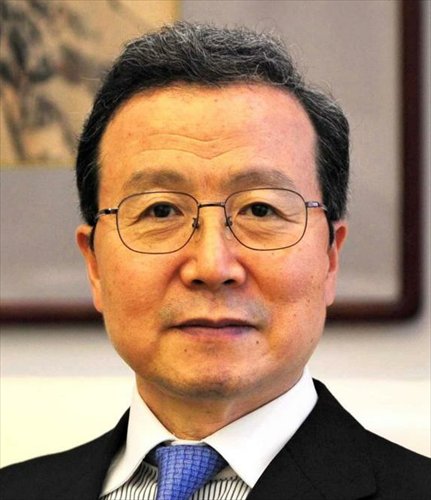Japan’s view of China remains problem

Cheng Yonghua
Editor's Note:
The relationship between China and Japan has seen setbacks over the past years after Japanese Prime Minister Shinzo Abe resumed office in 2012. Where do Sino-Japanese relations stand? What stops the bilateral relationship from improving? During the two sessions, Global Times (GT) reporter Sun Xiaobo talked with Cheng Yonghua (Cheng), Chinese ambassador to Japan and a member of the 12th National Committee of the Chinese People's Political Consultative Conference, over these issues.
GT: Where do the relations between China and Japan stand?
Cheng: The bilateral relationship was at its lowest ebb and went through the most difficult times before November 2014 because Japan took provocative actions on historical and territorial issues. We had to be tough to safeguard our sovereignty and interests. After rounds of negotiations, the two sides reached a four-point agreement in November 2014 and new rules were then made since previous rules were not obeyed. After that, Sino-Japanese relations gradually improved with positive and active interactions. But the improvements are still fragile and many problems still exist between the two countries.
Japan still perpetuates negative words and deeds on historical issues, particularly so last year which marked the 70th anniversary of the victory of the Chinese People's War of Resistance against Japanese Aggression (1937-45) and the World Anti-Fascist War.
But most importantly, Japan's perception of China remains blurry and it's unclear whether Japan considers China as a partner, threat or even rival. This was explicitly indicated in the act of the Japanese government in forcing through the new security bills last year.
We are concerned whether this means Japan will not adhere to peaceful development and whether this will affect China's security interests. We oppose how in this process Japan uses China as an excuse for military reinforcement and hypes up the China threat, which does no good to the improvement of Sino-Japanese relations or regional peace and stability.
Besides, Japan has acted improperly over the South China Sea disputes. In the long history of the waters, some islands were first discovered and administered by China. However, in the 1970s some of China's neighboring countries took away these islands, which led to current disputes in the South China Sea.
Those countries deliberately avoid mentioning their construction of military bases on the islands and yet criticize China over its legitimate measures to protect fishermen, conduct scientific research and defend itself.
Currently as some countries intend to flex their muscles in the South China Sea, Japan meddles to flare up the tensions and even wants to encircle China by aligning with others, which actually shows a Cold-War mind-set. Japan has taken the wrong position from the very beginning. This reflects what Japan thinks about China.
Now dialogue and communications between China and Japan at various levels and in various fields are recovering and there is even huge growth in economic cooperation and people-to-people exchanges.
But Japan's perception of China remains a fundamental problem and needs to be fixed. The words of the Japanese side to improve bilateral ties contrast with its negative deeds, which sends mixed and confusing messages.
China has made it clear that it attaches much importance to the relationship with Japan and hopes to grow bilateral relations in accordance with the four political documents and four-point agreement. We hope that the Japanese side can get back to the right track and work together with China to improve bilateral relations.
GT: Japan and South Korea reached an agreement on the "comfort women" issue late last year. Some observers say that this may provide some a reference point for China and Japan to address their disputes over the issue. What's your view?
Cheng: The "comfort women" issue refers to the severe crimes committed by Japanese militarism in China, South Korea and other Asian countries during WWII. But the situation differs in countries. The key to addressing the dispute between China and Japan lies in whether Japan has the sincerity to realize its wartime acts, admit its wrongdoing and make it up to the victims.
GT: In the past months, North Korea has conducted the fourth nuclear test and launched rockets, which has resulted in the harshest ever sanctions by the UN. What consequences do you think North Korea's acts will bring to the peace and stability in the region?
Cheng: China and North Korea enjoy a normal state-to-state relationship with a deep tradition of friendship. But Pyongyang's recent actions to develop nuclear weapons, conduct nuclear test and launch satellites violated the UN resolution. Pyongyang has to be punished since it broke the rules that prevent it from pursuing nuclear development. But this needs to be differentiated from North Korean people's well-being. The fundamental solution is to get North Korea back at the negotiating table of the Six-Party Talks and address the issue through dialogue. After all, there is no better substitute for the mechanism available right now to address concerns of relevant parties.
In this process, China's security interests must not be jeopardized. It is unacceptable that some are attempting to take this opportunity to deploy the Terminal High Altitude Area Defense system in the Korean Peninsula against China.